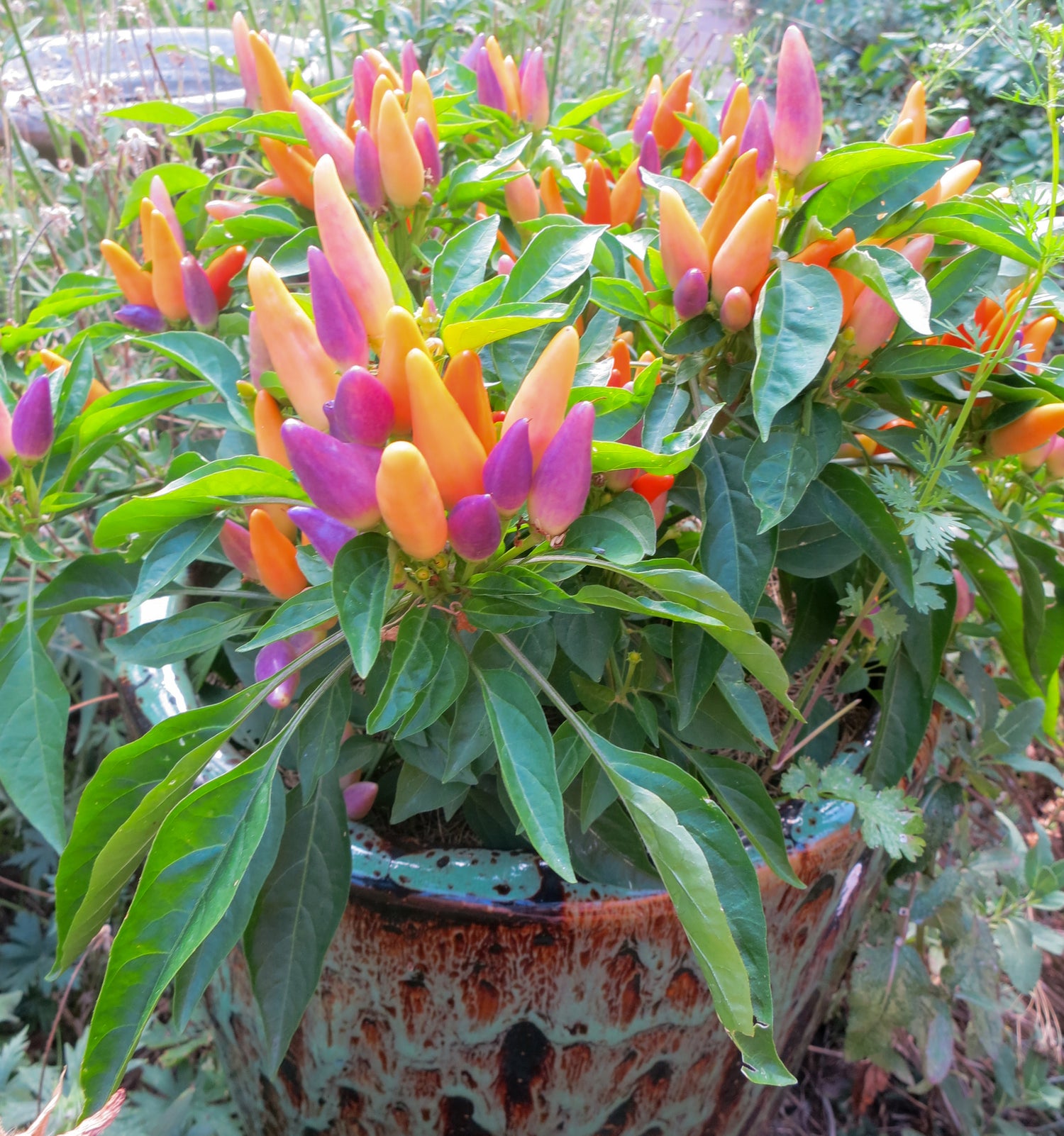
After transplanting chile plants outside, fertilize every 2 weeks with a dilute Fox Farm 'Grow Big' liquid fertilizer. It is 6-4-4 and plants need to grow big and tall before blooming. The bigger the plant means the more fruit it will be able to produce throughout the season. (Chiles are a continuous crop and produce fruit all season.)
When the chile plants first begin to flower, fertilize with dilute Fox Farm 'Tiger Bloom' 2-8-4. The increased phosphorus promotes flowering and increases root development. When there is a good set of fruit beginning to develop, stop applying any fertilizers with nitrogen.
Avoid Plants with Leaves and No Blooms:
It is important to only apply nitrogen fertilizer in the beginning (but not too much). An excess of nitrogen fertilizer in the soil will make plants with all leaves and no blooms. When the fruit is growing, do not apply any more fertilizer. The theory is that a little plant stress causes the plant to put all its resources into reproduction to produce good fruit and seeds for another season. That means big chiles with great flavor!
*In addition diluted Fox Farm 'Big Bloom' .01-.3-.7 worm castings and bat guano can be applied a couple times throughout the season. It works well when plants appear stressed from transplanting or excessive summer heat.
The information provided above is only a suggestion for fertilizing. You need to know about your own soil properties and also watch how your plants react to fertilizers. It is best to have prepared your garden soil ahead of time with an abundance of organic matter, and to continue to mulch your plants with organic matter during the growing season. ~
Now some details about N-P-K: Nitrogen – Phosphorous - Potassium.
Nitrogen (N) is required by plants in large amounts because it is required in many important functions and can be the limiting factor in plant production and proper crop development. It is vital because it is a major component of chlorophyll, the compound by which plants use sunlight energy to produce sugars from water and carbon dioxide by photosynthesis.
Plants take nitrogen from the soil continuously throughout their lives, and nitrogen demand usually increases as plant size increases. A plant supplied with adequate nitrogen grows rapidly and produces large amounts of succulent, green foliage. Providing adequate nitrogen allows an annual crop, to grow to full maturity, rather than delaying it. A nitrogen-deficient plant is generally small and develops slowly because it lacks the nitrogen necessary to manufacture adequate structural and genetic materials. It is usually pale green or yellowish because it lacks adequate chlorophyll.
Phosphorus (P) is an essential nutrient both as a part of several key plant structure compounds and as a catalysis in the conversion of numerous key biochemical reactions in plants. Phosphorus is noted especially for its role in capturing and converting the sun's energy into useful plant compounds.
Phosphorus plays a role in photosynthesis, respiration, energy storage and transfer, cell division, cell enlargement and several other processes in plants. A plant must have phosphorus to complete its normal production cycle. It is essential for the general health and vigor of all plants. Some specific growth factors that have been associated with phosphorus are:
- Stimulated root development
- Increased stalk and stem strength
- Improved flower formation and seed production
- More uniform and earlier crop maturity
- Improvements in crop quality
- Increased resistance to plant diseases
- Supports development throughout entire life cycle
Potassium (K) is essential in nearly all processes needed to sustain plant growth and reproduction. Plants deficient in potassium are less resistant to drought, excess water, and high and low temperatures. They are also less resistant to pests, diseases and nematode attacks. Potassium improves the overall health of growing plants and helps them fight against disease. Potassium affects quality factors such as size, shape, color and vigor of the seed or grain. It increases crop yields because it:
- Increases root growth and improves drought tolerance
- Activates at least 60 enzymes involved in growthAids in photosynthesis and food formation
- Helps translocate sugars and starches
- Increases protein content of plants
- Maintains turgor, reduces water loss and wilting
- Helps retard the spread of crop diseases and nematodes.
You can help your plants grow by providing the proper amounts of nutrients at the right times.
Adding homemade compost every season also helps boost nutrients and organic material in the soil.
Every season, every soil, and every crop is different, so remember gardening is an adventure. Enjoy the journey.
Click below to view all of the Hatch chile seeds we carry:




















